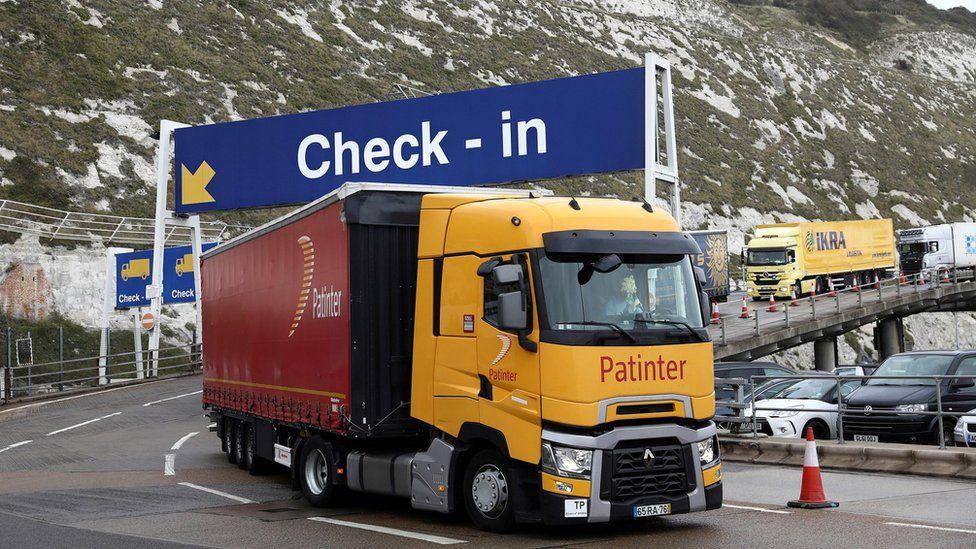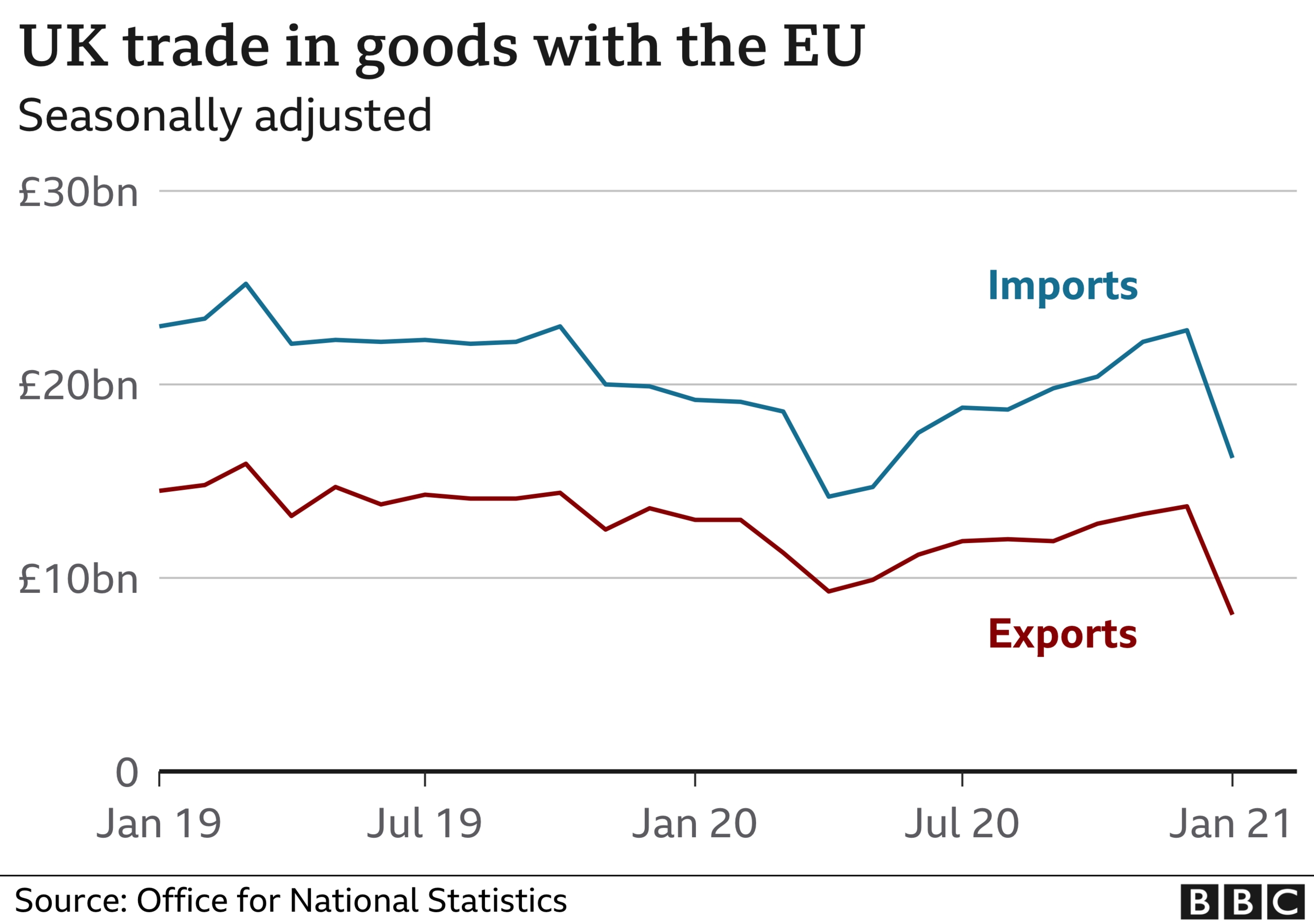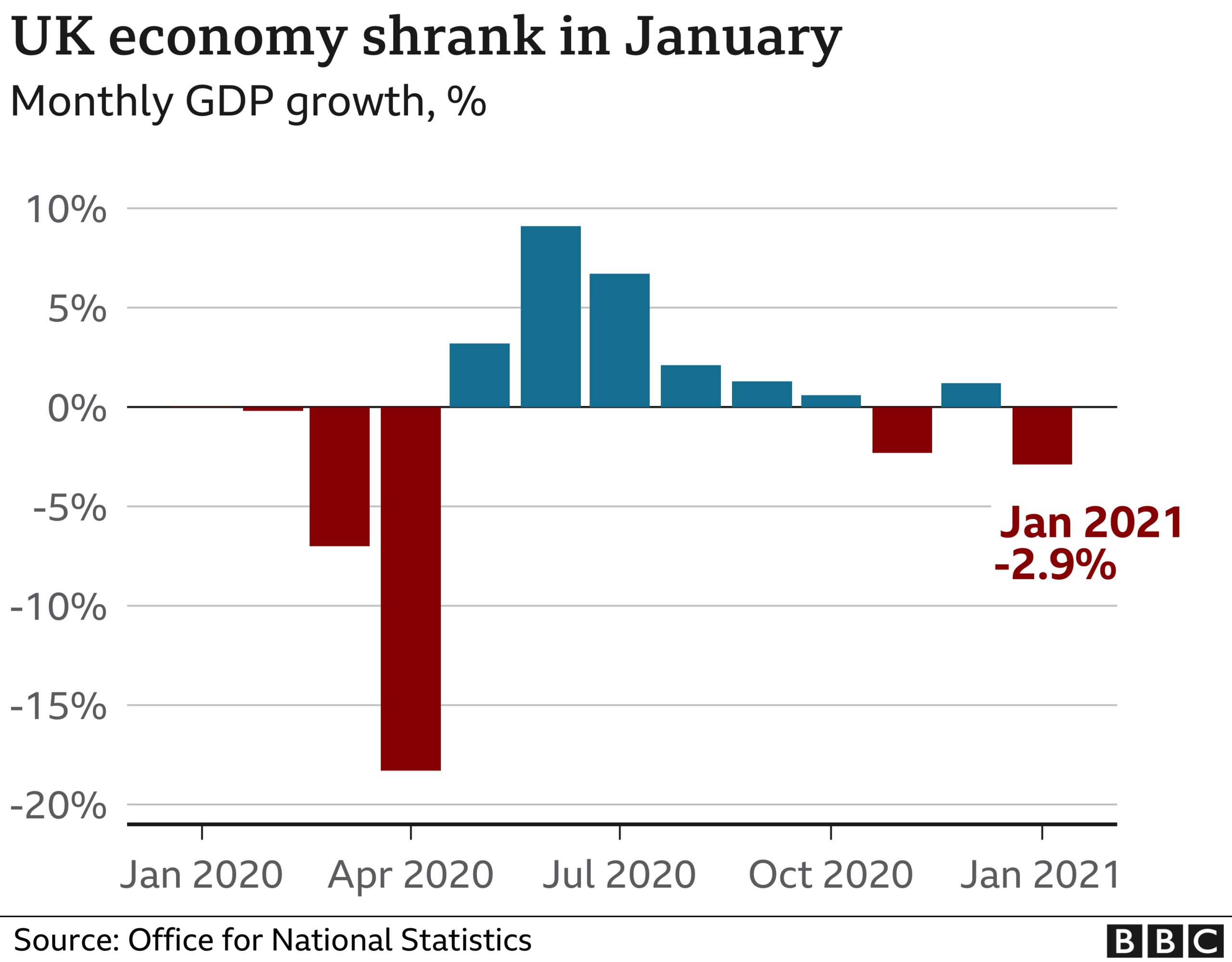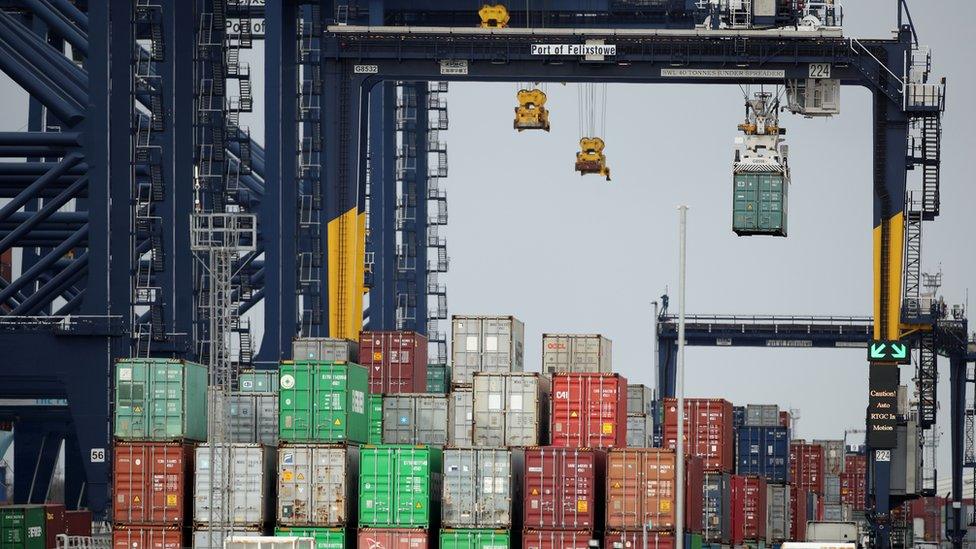UK exports to European Union drop 40% in January
- Published
- comments

UK goods exports to the European Union fell 40.7% in January, according to the Office for National Statistics (ONS), while imports tumbled 28.8%.
The figures show the biggest drop since records began in 1997, and are the first since new trading rules between the UK and the EU came into force.
The ONS said temporary factors were likely to be behind much of the falls.
Meanwhile, new data showed the UK economy shrank by 2.9% in January amid the third lockdown.
The economy is 9% smaller than it was before the start of the coronavirus pandemic.

What happened to trade?
Both imports from and exports to the EU fell "markedly" in January, the ONS said. The value of goods exported from the UK to the EU fell by £5.6bn in January 2021, while imports from the EU dropped by £6.6bn.
The ONS said the fall in goods coming into the country were largely seen in machinery and transport equipment, and chemicals from the EU.
Car imports, as well as medicinal and pharmaceutical products, were particularly affected.
Accountancy firm KPMG pointed to Brexit as the likely culprit for the plunge in trade between the UK and the EU. In contrast, the UK's trade with non-EU countries grew by 1.7% in January.
KPMG said intense stockpiling in December 2020 had brought some trade flows ahead of the Brexit deadline.
The ONS said companies may have been using up that stock instead of buying new goods in January.
In addition, the end of the temporary trading arrangement between the UK and the EU coincided with the discovery of a new strain of Covid-19 in the UK, which caused further complications and delays, after lorry drivers were required to take tests before crossing the border at the English Channel.

Should we be worried?
The figures are the first since the Brexit transition period ended and show the steepest falls since comparable records began.
However, the ONS said data showed that things had begun to pick up. Firms were reporting that trade was getting easier and trade levels started to recover towards the end of the month.
The number of businesses saying they were unable to export between the middle and the final week of January had fallen by 5.4%, it said, and those saying they could not import had dropped by 3%.
The ONS said the data for the period was "erratic", while Goldman Sachs called it "noisy", meaning there was a lot going on and it was too early to tell how much of the fall was a temporary blip.
However, the head of economics at the British Chambers of Commerce, Suren Thiru, said: "The significant slump in UK exports of goods to the EU, particularly compared to non-EU trade, provides an ominous indication of the damage being done to post-Brexit trade with the EU by the current border disruption.
"The practical difficulties faced by businesses on the ground go well beyond just teething problems and with disruption to UK-EU trade flows persisting, trade is likely to be a drag on UK economic growth in the first quarter of 2021."
A government spokesperson said: "A unique combination of factors, including stockpiling last year, Covid lockdowns across Europe, and businesses adjusting to our new trading relationship, made it inevitable that exports to the EU would be lower this January than last.
"This data does not reflect the overall EU-UK trading relationship post Brexit and, thanks to the hard work of hauliers and traders, overall freight volumes between the UK and the EU have been back to their normal levels since the start of February."


The Office of National Statistics was keen to add the relevant health warnings alongside the Brexit trade figures this morning.
Some of the drop in both imports and exports may be attributable to firms on both sides of the channel stockpiling ahead of the end of the Brexit transition period - so they didn't need to move as many goods in January. Some will also be down to the pandemic and in some industries that's difficult to disentangle from any Brexit effect.
Nevertheless, as economists have noted this morning, there's no sugar-coating a fall of 40.7% in exports of goods to the European Union in January, our first month under the new trade agreement negotiated by Boris Johnson and signed on Christmas Eve.
From the time of the referendum, the BBC has been highlighting the danger that it's not just tariffs that could jeopardise exports. The additional risk, well-known and well-discussed in Parliament, has always been that non-tariff barriers - such as vet checks on meat and poultry to the European Union - will boost exporters' costs sharply.
These costs will have to be passed on in higher prices, sharply reducing exporters' competitiveness. And that's if they can pull off the no-mean-feat of getting their goods across the Channel at all. The deal simply didn't get rid of non-tariff barriers to trade. Food exporters especially are now feeling the impact.

What happened to the economy during January?
The ONS said January's contraction in the economy, down 2.9%, was a "notable hit".
Retailers, restaurants and hairdressers were all affected by the latest Covid-19 lockdown.
Jonathan Athow from the ONS, said. "Manufacturing also saw its first decline since April with car manufacturing falling significantly."However, increases in health services from both vaccine rollout and increased testing partially offset the declines in other industries."
Economic activity in health stood out, increasing by 8.7%, mainly through Covid testing and vaccine schemes.
Pantheon Economics noted a 28.1% drop in output from the food services and accommodation sectors between December and January which "reflected many cafes and restaurants giving up on offering takeaway and delivery services, while the pandemic was raging".
It also said households "slammed the brakes on discretionary expenditure", sending retail and wholesale output down 9%.
What's the outlook for the economy?
The contraction during January reflects a difficult period for the economy as the third lockdown kicked in.
But it was much smaller than expected and commentators in the main struck a positive note.
Pantheon Economics said the GDP figures were "less dreadful than expected".
Capital Economics said the drop was smaller than during last April's lockdown, which fell 18.3% on the month.
Its UK economist, Paul Dale, said: "Overall, January's lockdown left the economy in a fairly big hole. But the government's easing roadmap has provided the ladder and the vaccinations are providing the willingness to climb out of it.
"By early next year, we think the economy will be peaking (sic) its head out of the top as GDP returns to the pre-pandemic level."
KPMG said: "Once restrictions are eased the economy is expected to pick up quickly, aided by the significant support the government has put in place. We expect growth of 4.6% this year."
Related topics
- Published11 March 2021

- Published9 March 2021